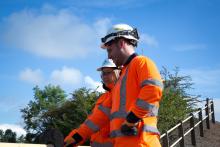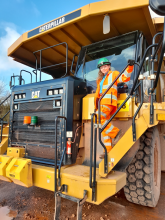James Roberts, Human Resources director at UK-based Aggregate Industries, has done a Q&A with our sister title Aggregate Business focusing on some of the challenges faced by major building materials suppliers when it comes to recruiting and maintaining a diverse and high-performing workforce.
In your/Aggregate Industries’ view, what are the challenges of HR in construction?
The good news is that things are certainly on the up for the UK's construction industry. Following a challenging couple of years, the UK project pipeline is looking healthier with more than £210bn of construction work set to get under way over the next two years. Plus, the PM’s recent admission that HS2 will go ahead is not only a positive in itself but an encouraging indication of the government’s commitment to continue to lead on delivering world-class infrastructure post-Brexit.
That said, there are still many challenges we need to overcome as a sector. On the HR front, one of the biggest tasks lies in addressing the skills gap. However, here at Aggregate Industries, we see it as an opportunity; a chance to generate new talent from a much wider pool, to increase inclusion and diversity, and to optimise the effectiveness of investment in learning and development in order to ensure we have the right future workforce in place.
In terms of achieving this, it’s about changing the outdated perceptions of the sector, as there are vast opportunities available in construction. From the constant introduction of innovative technologies and advanced new methods of working, through to the opportunity to be involved in pioneering projects, it has never been a more exciting time to work in construction – and we need to be much more vocal about this.
Crucially, this is not just in terms of targeting school-leavers and graduates either (which we continue to do through our successful apprenticeship programme) but in drawing from a much wider talent pool.
This incidentally brings me on to another key HR priority; driving greater diversity and inclusion. Asides from the obvious benefits of filling the skills gap, this will become increasingly interlinked to future industry success.
We must remember, after all, that our industry is changing. In the emerging new construction world, we will see the increasing use of digitisation, automation and artificial intelligence possibly transforming the way the industry operates and does business. This will require dynamism, innovation and ingenuity – with greater diversity and inclusion being key to this.
Another HR focus remains on continuing to curate a greater health and safety culture, one which places equal onus on physical and mental wellbeing.
This is a movement which we feel incredibly passionate about at Aggregate Industries and, as such, in 2014 we introduced Healthy You, an ongoing initiative geared towards helping establish better wellbeing amongst our employees through various awareness campaigns, talks on mindfulness, a regular mental health newsletter and specialist mental health first-aiders training.
Since its inception the programme has had a huge impact; according to our most recent data the number of different occasions of absence related to mental health issues at the business has decreased by 17%. More so, from talking and engaging regularly with employees, what’s great is that there seems to be more of a sense of openness attached to mental health and a willingness to talk about it.
How important is gender, age and employee background diversity and inclusion to AI when it comes to company HR?
Its importance cannot be underestimated. Managing greater diversity and inclusion is one of the defining moments of our time.
Over the years, it’s been great to see the industry come together in an applied, concerted approach to attain a more balanced workforce.
As part of this, Aggregate Industries has employed various tactics in recent years under the remit of achieving a 30% gender balance by 2030. This has included a much greater emphasis on female recruitment, the introduction of a mentor programme for female graduates, an annual women’s networking event, which last year saw more than 60 of our female colleagues come together, and a partnership with Working Mums, alongside the introduction of industry-leading maternity and paternity policies.
On a wider front, last year we also rolled out our ‘Respect at Work’ campaign, which is designed to ensure all people within the business are treated fairly. In terms of this year, our new focus is to delve more deeply into the issues facing smaller minority groups, gain a better understanding of their needs and make any required changes to ensure we are meeting them.
As we look to the future of construction, there’s no doubt that greater diversity and inclusion is key to not just unlocking access to a greater range of talent but also in shaping a more creative, innovative and progressive future workforce.
Has the embedding of industry-endorsed qualifications such as those offered by the University of Derby’s Centre for Mineral Products Professional Development had an impact on building materials industry HR? Can more be done in this area? From your experience, how industry-ready are graduates on these courses?
As we all know, it’s important that we do everything we can to encourage new talent into our industry. It is therefore fantastic to see education establishments such as The University of Derby take up the mantel with its Higher Apprenticeship specifically designed for those seeking to enter the quarry industry.
Amid high university costs, there seems to have been a distinctive shift towards more people opting for an apprenticeship route over the once traditional degree path, as a way to train for a highly-skilled job, without getting into debt. As such, we’d welcome even more courses designed to entice what is becoming an increasingly captive audience into an industry that is progressive and exciting.
At Aggregate Industries, we are proud of the fact that we have a successful annual Apprenticeship Programme, designed to offer people the chance to earn while they learn. Successful candidates are given the opportunity to gain on-the-job experience, whilst achieving professional qualifications – helping them to lay a solid foundation for a career in construction.
This enables social mobility, allowing people from a variety of different backgrounds the chance to enter the industry, whether it be the younger generation, ex-offenders or ex-military professionals.
Each year, the Programme comprises tailored placements for the apprentices across a variety of business divisions. This includes working at some of the UK’s largest quarries, state-of-the-art asphalt plants and on some of the country’s biggest road improvement schemes - as well as areas such as finance and HR.
This year’s programme will include nearly 30 nationwide positions, comprising various level two, three and four apprenticeship roles in areas such as business admin, mobile and static plant, minerals management, electrical and mechanical engineering, plant operations and sales. With the programme now in its fifteenth year, we have successfully trained more than 300 graduates and apprentices in a number of these roles to date.
Given the continuing rise in prominence of artificial intelligence (AI) and technology generally, how do you see the composition of HR/the workforce in the building materials supply sector changing over the next decade?
To retain our position as an industry innovator, we know that we must work together to think beyond products and focus on potential applications which could bring benefits to our customers and also improvements to our own operations.
From robotic process automation (RPA) to machine learning and autonomous vehicles, there are vast opportunities for the construction sector. In recent years, for example, we have begun utilising the latest drone technology to allow us to measure our onsite stocks. While this is still in the infancy stages, we continue in our strategy to better leverage these to both our own and our customers’ advantage.
To assist with this, we now have a Digital Project manager, leading the key digital projects that are ongoing within the company, as well as a group-wide digital development programme focused on building digital leadership capability and equipping them with tools to solve business problems with digital solutions. We've also developed an Aggregate Industries Digital Roadmap, which involves building on our existing digital capability and working with the wider LafargeHolcim group on areas such as predictive maintenance, demand forecasting and dynamic pricing.
We are also starting to understand practical uses for technologies that will positively impact our employees and customers. For example, we have recently developed virtual reality (VR) health and safety inductions, as well as training modules, providing a much more effective way of demonstrating best practices visually.
In the HR capacity specifically, it is likely that such technology may take up a much bigger role in the more admin-based everyday tasks, such as data management, processing and even payroll, but the reality is that the more human-element roles will remain people-focused.
Ultimately, it really is a significant time for the UK construction sector. As we transition nearer towards the emerging modern construction world, one of greater diversity, increased integration and collaboration, truly transformative technology and innovative new ways of working, there will be many challenges but there will also be abundant possibility. Here at Aggregate Industries, we remain firmly in the fast lane, committed in our role helping to shape the tomorrow of construction, today.
Career biography
James Roberts has an international pedigree for managing HR in large companies, having spent almost 20 years of his life living overseas. He started his HR career in GEC leading Manufacturing for Gas Turbines & Turbochargers in Lincoln, followed by eight years in Paris working for Alstom Transportation where he led HR for the Manufacturing division and then led Organisation Development. Roberts then worked in Switzerland leading HR for Alstom Power Services, the world’s largest Power Generation Services Company. He joined AIUK from GE where he was in charge to lead the people and organisation integration of the GE acquisition of the Power Services Business.








